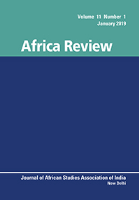
Africa Review
Scope & Guideline
Exploring Africa's Rich Tapestry of Knowledge
Introduction
Aims and Scopes
- Socio-Political Dynamics:
Examines the political structures, governance issues, and social movements across African nations, emphasizing the interplay between local and global forces. - Economic Development and Policy Analysis:
Focuses on economic strategies, development policies, and their implications for growth and sustainability in African contexts. - Cultural Studies and Artistic Expression:
Explores the rich tapestry of African cultures, including literature, art, and indigenous knowledge systems as forms of resistance and resilience. - Health and Environmental Challenges:
Investigates public health issues, disease burden, and environmental sustainability, particularly in relation to socio-economic factors. - Migration and Mobility:
Studies the complexities of migration patterns, including historical and contemporary perspectives on displacement and integration.
Trending and Emerging
- Digital Transformation and Surveillance:
An increasing focus on the implications of digital technologies and surveillance in governance and society, highlighting the intersection of technology with politics and public health. - Climate Change and Environmental Justice:
Growing attention to the impacts of climate change on human mobility, public health, and economic stability, emphasizing the need for sustainable development practices. - Indigenous Knowledge and Resilience:
A resurgence of interest in indigenous knowledge systems as frameworks for conflict resolution and community resilience, reflecting a shift towards valuing local perspectives. - Health and Socioeconomic Factors:
An emerging theme linking healthcare challenges to broader socioeconomic issues, particularly in the context of the COVID-19 pandemic and its aftermath. - Regional Cooperation and Integration:
An increasing emphasis on the dynamics of regional cooperation, particularly in terms of trade agreements and collective security, which reflects the need for collaborative solutions to cross-border issues.
Declining or Waning
- Colonial Historical Analysis:
Though historical perspectives remain relevant, the focus on colonial narratives and their direct implications has diminished in favor of contemporary issues and solutions. - Traditional Conflict Resolution Mechanisms:
Research on indigenous conflict resolution practices has seen a reduction, possibly overshadowed by more pressing contemporary conflict dynamics. - Static Economic Models:
Older economic frameworks that do not adapt to the rapidly changing African economic landscape are being replaced by more dynamic and context-sensitive analyses. - Single-Narrative Studies:
There is a waning interest in studies that focus solely on one aspect of African life, as interdisciplinary approaches gain traction. - Gender Studies in Isolation:
While gender issues remain crucial, the examination of these topics in isolation from broader socio-political contexts is less frequently pursued.
Similar Journals
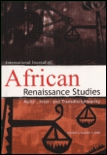
International Journal of African Renaissance Studies
Advancing Scholarly Dialogue on Africa's Rich HeritageThe International Journal of African Renaissance Studies, published by Routledge Journals, Taylor & Francis Ltd, is a leading multidisciplinary platform dedicated to advancing knowledge and discussion around African cultural, historical, and literary contributions. With an ISSN of 1818-6874 and an E-ISSN of 1753-7274, this esteemed journal has consistently earned its place in notable rankings, achieving Q2 status in History, Literature and Literary Theory, and Visual Arts and Performing Arts. Operating from its hub in the United Kingdom, the journal offers robust insights into the intersections of Africa's past and present, making it an essential resource for researchers, professionals, and students alike. Although currently not open access, the journal stands out with its commitment to promoting scholarly dialogue and innovative research, fostering a comprehensive understanding of the African Renaissance over the years from 2015 to 2024. With its impressive Scopus rankings, including a remarkable 85th percentile in Literature and Literary Theory, the journal serves as an indispensable tool for anyone looking to deepen their understanding of African contributions to the global narrative.
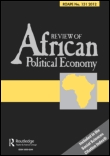
Review of African Political Economy
Illuminating the complexities of African socio-political landscapes.Review of African Political Economy, published by ROUTLEDGE JOURNALS, TAYLOR & FRANCIS LTD, serves as a pivotal platform for scholarly discourse on the dynamics of political and economic transformations across Africa. With an Impact Factor reflective of its academic rigor and importance, this journal ranks in Q2 across Development and Geography, Planning and Development categories, and Q1 in Political Science and International Relations as of 2023. Established in 1974 and continuously evolving through to 2023, it provides vital insights drawn from contemporary research that contribute to the understanding of socio-political challenges and economic developments facing the African continent. Researchers, analysts, and students are encouraged to engage with its comprehensive array of articles, case studies, and theoretical discourse, aimed at fostering a deeper understanding of African political economies. Although it does not offer Open Access, its critical contributions in shaping policy and academic perspectives in the region make it an essential resource for those invested in African studies.
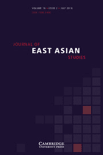
Journal of East Asian Studies
Exploring the Dynamics of East Asia's SocietiesThe Journal of East Asian Studies, published by Cambridge University Press, serves as a pivotal academic platform for scholars and practitioners who are dedicated to the multifaceted exploration of East Asian societies. With an ISSN of 1598-2408 and an E-ISSN of 2234-6643, this journal has been disseminating significant research since its inception in 2008 and continues to be a crucial resource for advancing scholarly dialogue up to 2024. Recognized for its contributions, it holds prestigious quartile rankings in various fields, including Q2 in Development, Political Science and International Relations, and Q3 in Economics and Econometrics, showcasing its broad impact within the social sciences. With Scopus rankings reflecting its robust presence in political science, sociology, and economics, this journal appeals to a wide audience of researchers, educators, and students. As it aims to foster a comprehensive understanding of East Asian political, economic, and social dynamics, the Journal of East Asian Studies remains an essential resource for those looking to engage deeply with the complexities of this vital region.
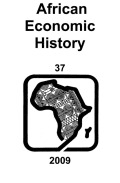
AFRICAN ECONOMIC HISTORY
Advancing Insights into Africa's Economic LegacyAFRICAN ECONOMIC HISTORY is a distinguished academic journal published by the University of Wisconsin-Madison’s African Studies Program, focusing on the complex interplay of economic and historical dynamics in Africa. With its ISSN 0145-2258 and E-ISSN 2163-9108, this journal has been a vital resource since its inception in 1976, showcasing pioneering research that traverses various periods and regions across the continent. The journal is highly regarded in its field, holding a Q2 ranking in History and a Q4 ranking in Economics and Econometrics according to the latest category quartiles. It remains committed to advancing knowledge through rigorous scholarship while maintaining academic integrity and relevance in an evolving global landscape. Although not open access, it provides critical insights and a platform for discourse among researchers, economists, and historians alike. By delving deeply into the economic factors that shape societies, AFRICAN ECONOMIC HISTORY continues to contribute significantly to the understanding of Africa's past and its implications for the future.

LATIN AMERICAN RESEARCH REVIEW
Celebrating the vibrant cultures and histories of Latin America.LATIN AMERICAN RESEARCH REVIEW, published by Cambridge University Press, is a premier open-access journal dedicated to advancing scholarship in the field of Latin American studies. Established in 1970, the journal has consistently evolved to address critical interdisciplinary issues, encompassing a broad spectrum of topics from anthropology and cultural studies to economics and political science. With its strong impact reflected in 2023's quartile rankings, including Q1 in both Cultural Studies and History, LATIN AMERICAN RESEARCH REVIEW ranks among the top-tier journals in multiple disciplines, capturing the interest of scholars worldwide. This journal not only fosters a deeper understanding of Latin America's diverse cultures, histories, and socioeconomic landscapes but also serves as a vital platform for innovative research and discussions. By offering open access since 2017, it ensures that its valuable contributions are widely disseminated, making it an indispensable resource for researchers, professionals, and students alike who are looking to engage with contemporary Latin American issues.

JOURNAL OF MODERN AFRICAN STUDIES
Connecting Cultures and Ideas Across the African ContinentJOURNAL OF MODERN AFRICAN STUDIES, published by CAMBRIDGE UNIV PRESS, is a premier academic journal that has been a cornerstone for interdisciplinary research on contemporary issues facing Africa since its inception in 1963. With an ISSN of 0022-278X and an E-ISSN of 1469-7777, this journal plays a critical role in shaping the discourse around African studies, encompassing vital topics in Geography, Planning and Development and Sociology and Political Science. The journal holds a commendable Q2 quartile ranking in both fields, indicating its solid reputation and influence, with Scopus ranks reflecting its academic impact within the top echelons of social sciences. The journal’s commitment to quality scholarship aims to foster a deeper understanding of socio-political dynamics, cultural transformations, and economic developments across the continent. While it does not offer open access, its rigorous peer-review process ensures that contributions are impactful and relevant to researchers, professionals, and students alike. The JOURNAL OF MODERN AFRICAN STUDIES continues to be essential reading for anyone engaged in the ever-evolving narratives of modern Africa.
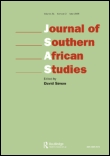
JOURNAL OF SOUTHERN AFRICAN STUDIES
Engaging Scholars in the Heart of Southern African ResearchThe JOURNAL OF SOUTHERN AFRICAN STUDIES, published by Routledge Journals, Taylor & Francis Ltd, is a premier scholarly outlet dedicated to the exploration and analysis of social, political, and cultural dynamics affecting the Southern African region. With an established history since 1974, this journal features articles that contribute significantly to various disciplines, including Arts and Humanities, Sociology, and Geography, and is recognized within its fields as evidenced by its Q2 and Q3 quartile rankings in the latest assessments. Offering a rich academic platform for researchers, professionals, and students, it fosters interdisciplinary approaches and welcomes critical discourse on contemporary issues, ensuring relevance and impact in today's rapidly changing socio-political landscape. Notably, the journal has achieved commendable rankings on Scopus, affirming its standing as an influential source of knowledge. Although not open access, it remains a vital resource for those seeking to deepen their understanding of Southern Africa and its global implications.

ENGLISH STUDIES IN AFRICA
Bridging Cultures through English StudiesENGLISH STUDIES IN AFRICA is a premier journal dedicated to advancing the field of literature and literary theory, published by Taylor & Francis Ltd, a leading name in academic publishing. With a focus on the intersection of English studies and African contexts, the journal has been a vital platform for over six decades, contributing to an enriched understanding of literary culture within the African diaspora from 1958 to 2024. While its impact factor is not explicitly listed, its Scopus rank of 146 out of 1106 journals in the category places it within the top 14% of its field, reflective of its significant scholarly contribution and rigorous peer-review process. As an essential resource for researchers, professionals, and students alike, ENGLISH STUDIES IN AFRICA fosters critical dialogue and interdisciplinary collaboration, making it a cornerstone for ongoing literary exploration and research in the region.
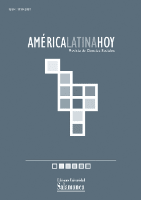
America Latina Hoy-Revista de Ciencias Sociales
Elevating Latin American Scholarship to New HeightsAmerica Latina Hoy-Revista de Ciencias Sociales, published by EDICIONES UNIV SALAMANCA, is a premier open-access journal dedicated to the exploration of social sciences within the Latin American context. Since its establishment in 1991, the journal has provided a platform for scholarly discourse covering a broad range of topics, including history, sociology, and political science. With an impressive Q1 ranking in History and a Q3 ranking in Sociology and Political Science, the journal exemplifies excellence and rigorous scholarship in its field. Its inclusion in prestigious databases such as Scopus, ranked #248 out of 552 in Arts and Humanities, underscores its impact as an essential resource for researchers, academics, and students alike. Based in Salamanca, Spain, the journal actively promotes interdisciplinary approaches and embraces contributions that advance the understanding of Latin American societies. With its open-access model, America Latina Hoy ensures that research findings are freely accessible, fostering knowledge dissemination and engagement across borders.
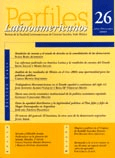
Perfiles Latinoamericanos
Connecting Researchers to the Pulse of Latin AmericaPerfiles Latinoamericanos is a prominent academic journal published by FLACSO-MEXICO, dedicated to advancing scholarly discourse in the fields of Sociology and Political Science. Since its inception in 1992, this Open Access journal has made significant contributions to the understanding of Latin American societal and political dynamics, providing researchers, professionals, and students with valuable insights and analysis. With an ISSN of 0188-7653 and an E-ISSN of 2309-4982, the journal has established itself as a reliable source of knowledge, boasting a respectable Scopus rank within the 36th percentile among its peers. As of 2023, it holds a Q3 ranking in Sociology and Political Science, reflecting its commitment to maintaining rigorous academic standards and fostering impactful scholarship. Researchers can easily access its published articles, contributing to a wider dialogue on critical issues affecting the region. The journal’s coverage span from 2008 to 2024 affirms its ongoing relevance in the academic community.